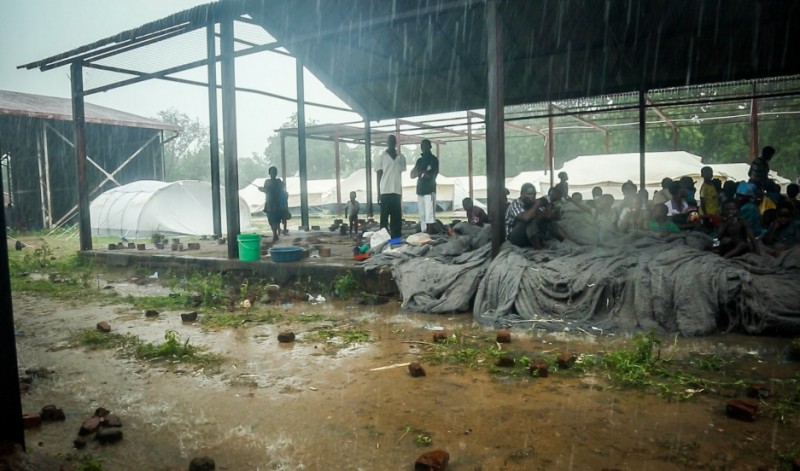
Malawians evacuated after devastating floods in late January wait out another deluge at a makeshift shelter. Roughly 175,000 people have been displaced and crops were destroyed by what the country's president says is the worst flooding in its history. Credit: Sam Eaton. Published with PRI's permission.
This article and a radio report by Sam Eaton for The World originally appeared on PRI.org on February 5, 2015, and is republished as part of a content-sharing agreement.
Even for a country used to flooding, this has been something beyond pretty much anyone's experience.
Roughly 175,000 people displaced, widespread destruction of staple crops like maize, and a looming public health crisis following what observers say is the worst flooding in Malawi in half a century.
A 69-year-old man who’d lived near the banks of the Shire river, the site of some of the worst flooding since the torrents began in mid-January, says he’s never seen anything like it in his life. The floods come every year, he says, people can plan for them, but this time was different.
Families tell stories of watching their homes collapse, sometimes on top of them, and climbing onto termite mounts, the only high ground left, waiting for helicopters or boats to rescue them. Crocodiles sometimes circled the water around them, they say.

The disastrous floods have largely affected areas along the Shire river in far southern Malawi. The region is prone to flooding, but locals say the recent floods are the worst in at least a half century. Public domain image via Wikipedia Commons
At a camp for displaced people in Bangula, in southern Malawi, everyone I spoke with said they lost everything except the clothes they were wearing.
(See more images from Sam Eaton's visit to the Malawi flood zone at PRI.org.)
In the camp itself, conditions are miserable, with as many as 10 families sharing a tent without mosquito netting and little protection from the continuing rains or blazing sun between downpours. Women cooking over open fires say there isn’t enough food. I heard reports of male camp workers demanding sex in exchange for some of the little food there is, and girls afraid of being raped at night, when there’s little lighting or security.
Meanwhile, thousands remain isolated in places that can’t be reached by road. Crews are trying to deliver food to these areas by helicopter.
The causes of the disaster are a complex mix, including those torrential rains, high population density and deforestation. In the Shire river watershed, the hillsides have been completely deforested, for cooking fuel among other things, so there’s nothing to stop the huge amounts of rainfall from surging down into the valleys.
Listen to rain fall in Malawi:
Climate change may also be involved. The intensity of the storm system behind the floods fits cleanly with what climate models have been projecting as carbon emissions trap more energy in the atmosphere. These storms can have devastating effects on poor countries like Malawi, where many families live in simple mud brick homes and farm plots that just can’t withstand this kind of weather.
Observers now fear the story that’s going to evolve here over the weeks and months ahead will be that of a serious food shortage. Many farmers’ fields have been completely devastated, leaving little opportunity to replant before the end of the country’s short rainy season. And the floods come at the tail end of a severe drought that also took a toll on food production.
And the country’s government is hardly in a position to respond to the crisis. Foreign aid, which makes up about 40% of Malawi’s economy, was recently cut off in the wake of a giant corruption scandal. And this week the parliament went on strike demanding higher salaries. So the government is barely operating.
Instead NGOs are largely running the relief efforts, but they’re already running short on cash.
And with more rains in the forecast, the conditions that caused this widespread displacement event are far from over.







4 comments
It was on Al jazeera